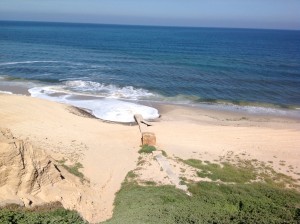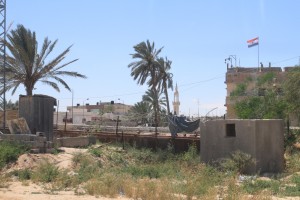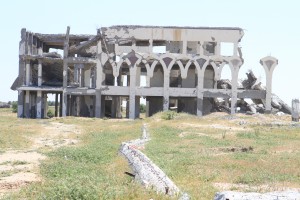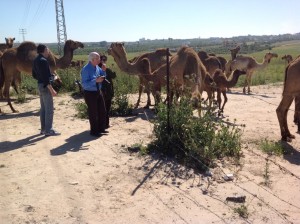On a tour and a prayer: Day eight in Gaza, by Gerri Haynes
(Washington Physicians for Social Responsibility has been sponsoring delegations to Gaza since 1993. In 2009, the group began offering medical service work to the people of Gaza.)
The Call to Prayer awakens us each morning at about 4:30 – through our window, we hear calls from many different mosques – the sound is beautiful. Through the call comes the song of several roosters – morning in Gaza.
Today being Friday, the clinics are closed and we were treated to a van trip to the western, eastern, and southern borders of Gaza. We looked down at the sea to observe some of the 90 million liters of partially or fully untreated sewage that flows each day into the Mediterranean from Gaza. We stood on the edge of the 35% of arable land in the east that is called the “no go zone” – that part of Gaza forbidden to normal traffic or to the growing of historically tall crops. This land borders Israel and is considered by Israel to be a security buffer zone. Trees have been eliminated here and only on the furthest west part of the zone do farmers plant low-growing crops…crops that provide no shelter from Israeli observation. Israeli border guards shoot farmers wandering “too far” into this area.We visited the Gaza airport – once a hopeful sight whose opening was celebrated in person by President Bill Clinton, the airport is destroyed. No planes fly in or out of Gaza – the airspace is controlled by Israel and Israeli warplanes, drones and observation balloons fly regularly over Gaza. We stopped at the Rafah border with Egypt – since the change of government in Egypt, this border is now often closed. And then we visited the tunnel area. At their peak, hundreds of tunnels were used for the importation of goods from Egypt to Gaza. In the last six months, the tunnels have been destroyed by Egypt and the effect of their loss has had a devastating effect on the economy of Gaza – jobs lost, the price of goods increased, fewer goods available, etc. Life in a prison.
And then, this afternoon, an inspiring young man who is a nurse in a local hospital came to visit us. He and his friends are working on two projects. The first involves continuing education for nurses and the second is a support project for children – providing the children with joyful activities in an effort to relief the suffering of life. We will learn more about these projects!
Grant O’Keefe wrote the following – we are deeply grateful to have Grant on our “team.”

Some 90 million liters of partially or fully untreated sewage flows each day into the Mediterranean from Gaza.
“Every person I have spoken with has a different story, of course, but there are a few things that are remarkably similar. First is the importance and love of family and children. Everyone is so gentle and patient with children; this in an environment that would otherwise not seem to foster either. Second is that everyone here feels abandoned by the rest of the world; they are living in the world’s largest prison. Among all their needs, almost everyone asks that we tell the rest of the world about the terrible situation in Gaza and also that “we are not all terrorists”. I have heard this exact phrase more often than I could count.
“You might assume that medical care isn’t terrible given that the patients I have seen come with CT scans and MRIs, both of which are available in the hospitals in Gaza. This assumption is wrong. The surgeons here are operating with instruments that are almost unusable, in gowns that are torn and wearing thin, and have little access to supplies and medicines that are inexpensive, should be easily available and are necessary to practice surgery safely.
“The pace of work here is not tiring for me nor is it excessive, yet, today, I am exhausted. I need to be alone to recharge and to try to sort out all of this. Introverts will empathize, but this time it is more extreme.”
RSS feed for comments on this post. TrackBack URI


